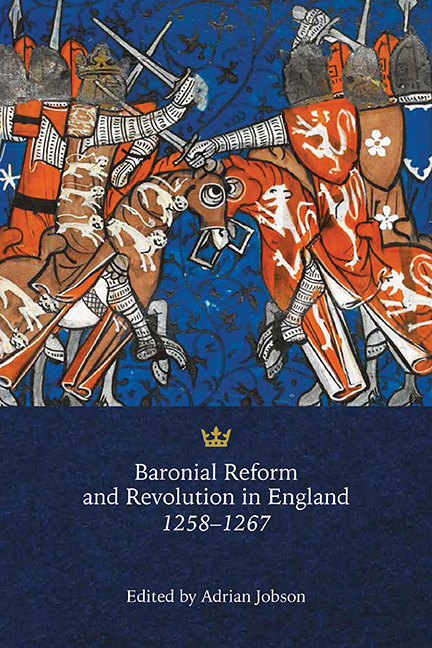Book contents
- Frontmatter
- Dedication
- Contents
- List of Illustrations
- Acknowledgements
- List of Abbreviations
- Introduction
- Modern Historians and the Period of Reform and Rebellion, 1258–1265
- The Secret Revolution of 1258
- Baronial Reform, the Justiciar’s Court and Commercial Legislation: The Case of Grimsby
- Crisis Management: Baronial Reform at the Exchequer
- Local Administration during the Period of Reform and Rebellion
- What Happened in 1261?
- Writing Reform and Rebellion
- Civic Government in Troubled Times: London c.1263–1270
- The Montfortian Bishops
- Reformers and Royalists: Aristocratic Women in Politics, 1258–1267
- The Midlands Knights and the Barons’ War: The Warwickshire Evidence
- Retinues, Agents and Garrisons during the Barons’ Wars
- The Barons’ War in the North of England, 1264–1265
- The Maritime Theatre, 1258–1267
- Reasserting Medieval Kingship: King Henry III and the Dictum of Kenilworth
- Index
Modern Historians and the Period of Reform and Rebellion, 1258–1265
Published online by Cambridge University Press: 21 May 2021
- Frontmatter
- Dedication
- Contents
- List of Illustrations
- Acknowledgements
- List of Abbreviations
- Introduction
- Modern Historians and the Period of Reform and Rebellion, 1258–1265
- The Secret Revolution of 1258
- Baronial Reform, the Justiciar’s Court and Commercial Legislation: The Case of Grimsby
- Crisis Management: Baronial Reform at the Exchequer
- Local Administration during the Period of Reform and Rebellion
- What Happened in 1261?
- Writing Reform and Rebellion
- Civic Government in Troubled Times: London c.1263–1270
- The Montfortian Bishops
- Reformers and Royalists: Aristocratic Women in Politics, 1258–1267
- The Midlands Knights and the Barons’ War: The Warwickshire Evidence
- Retinues, Agents and Garrisons during the Barons’ Wars
- The Barons’ War in the North of England, 1264–1265
- The Maritime Theatre, 1258–1267
- Reasserting Medieval Kingship: King Henry III and the Dictum of Kenilworth
- Index
Summary
Over the last four centuries, historians have interpreted and reinterpreted the political crisis of the years 1258 to 1265 many times and in very different ways. Commentators’ responses to the period have been shaped over time by political and social circumstances, the availability of primary sources, intellectual trends and the working practices of historians. What follows is a brief discussion of historians’ interpretations of this period and the factors that helped to produce these different analyses. The subject is a large one and would repay closer, more detailed research. Recent historians of the years 1258–65 have often been reticent about reflecting on historiography, a point made by Michael Clanchy in his own valuable examination of the historiography of thirteenth-century England as a whole, and particularly of the work of Sir Maurice Powicke and T.F. Tout, in a valuable paper he gave at the fifth Thirteenth Century England Conference in 1993. C.H. Knowles also examined the historiography surrounding Simon de Montfort, earl of Leicester, in a pamphlet produced in 1965 for the 700th anniversary of his death. I have drawn on the analyses of Clanchy and Knowles where relevant.
Here, I concentrate on the way historians since the seventeenth century have approached the period of reform and rebellion. Space precludes a detailed account of all developments in study of these years. Rather, I attempt to examine the themes that have interested historians and how these themes led them to approach the period. The essay falls into two parts. The first part examines, chronologically, the nature of the approaches to the period taken by historians up to the middle of the twentieth century. The second part looks thematically at the approaches of historians working today and places these in the context of earlier work.
For many commentators before the mid nineteenth century, the period seemed to have direct political relevance to their own times. Unlike the late-nineteenthand early-twentieth-century ‘constitutional’ historians, seventeenth-century writers disapproved of the baronial movement's revolutionary character. Sir Robert Cotton, Member of Parliament and antiquary, published A Short View of the Long Raigne of King Henry the Third two years after the accession of King Charles I.
- Type
- Chapter
- Information
- Baronial Reform and Revolution in England, 1258-1267 , pp. 13 - 29Publisher: Boydell & BrewerPrint publication year: 2016

